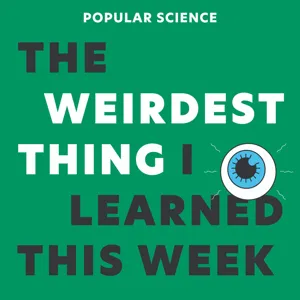Podcast Summary
The deep connections and shared history among people, like mycelium in a forest, are essential for community resilience.: People's deep connections and shared history foster community resilience, just as mycelium networks are crucial for forest ecosystems.
The interconnectedness of living organisms, using the example of mycelium in a forest, mirrors the deep connections and shared history among people, particularly those who have endured hardships and built communities together. This was poignantly illustrated in the story of Yogeve and Oded Lipschitz, whose lives were forever altered by the conflict between Israel and Gaza. The Lipschitz family's story began decades ago when they fled Poland to build a new life in Palestine at Kibbutz Niroz. Their connection to the land and to each other was so strong that it endured through generations, with their children and grandchildren carrying on their legacy. The loss of Oded, who was taken hostage during the conflict, left a profound impact on his family, highlighting the fragility and importance of these connections. The mycelium network in a forest may be invisible, but it is essential for the survival and growth of the forest ecosystem, much like the deep, unseen connections among people that sustain communities and provide resilience in times of adversity.
The Holocaust and the establishment of Israel shape a family's journey: Despite the trauma of the Holocaust, the establishment of Israel gave a sense of safety, belonging, and purpose, leading to new beginnings and the cultivation of a lasting legacy.
The experience of losing their family during the Holocaust led the protagonist's father to question the existence of God, but the establishment of Israel gave the family a sense of safety and belonging, leading the next generation to build a new life together in this new country. Despite the challenges and conflicts, the sense of starting anew and having a homeland to defend instilled a deep sense of euphoria and purpose. The meeting and eventual marriage of Inikabuts and Oded marked the beginning of a new chapter in their lives, filled with love, growth, and the cultivation of a cactus farm that has lasted over six decades.
A father's activism for peace and social justice: A father's commitment to peace and social justice inspired his son to fight for harmony between nations and communities, instilled through activism against Israeli occupation and displacement of Palestinians.
The speaker's father, who was part of a kibbutz-building effort in Israel, had a deep commitment to communal living, peace, and social justice. He believed in building bridges between nations and living harmoniously with Arab neighbors. His activism extended beyond ideals, as he regularly participated in protests against Israeli occupation of new territories and the displacement of Palestinians. Growing up, the speaker was immersed in this environment, which instilled in him a strong sense of fighting for peace. This activism began in the aftermath of the 1967 Arab-Israeli War and continued as Israeli authorities pushed Bedouin Arabs off their land in the Sinai Peninsula. The father's actions reflected his strong opinions, extensive knowledge, and dedication to humanistic values.
Adid and Yoghavid's activism for peace: Through activism and using powerful imagery, Adid and Yoghavid inspired a peace movement during the Israeli-Egyptian conflict, despite the tragic loss of Adid's life.
The activism of Adid and Yoghavid during the Israeli-Egyptian conflict was a powerful response to the desire for reconciliation and peace in the region. Adid, a man with a strong sense of justice, believed that returning disputed lands could have led to a long-term agreement and a better future for all parties involved. He and Yoghavid, a photographer, used her images of destroyed buildings and bulldozed land to raise awareness and spark a growing peace movement. Tragically, Adid was taken hostage and killed during a war before they could fully achieve their goals. Despite this, their efforts towards shared humanity and working towards agreements with neighbors continue to inspire.
Photographer documents kidnapping experience through mental imagery: Photographer Yohavid used mental imagery to document tragic events during kidnapping, coping with emotions and danger through determination to remember and share experiences.
During a harrowing experience of being kidnapped and taken through tunnels in the Gaza Strip, photographer Yohavid was able to document the tragic events around him by capturing them in his mind. He encountered a community of abducted people, some of whom shared heart-wrenching stories of loss and violence. Among the most memorable sights was that of a distressed mother carrying her frightened four-year-old daughter through the tunnels. Despite the overwhelming emotions and danger, Yohavid's determination to remember and share the experiences of his community helped him cope with the situation.
Encounter with Hamas Leader: A captive woman bravely spoke out to Hamas leader for peace but was ignored, endured illness, and was eventually released, leaving her with sadness for those still held and relief to go home.
During her captivity, a woman encountered the Hamas leader, Yahya Sinwar, who came to reassure the hostages that a deal was imminent. She bravely spoke out, expressing her anger over the senseless violence against their community, who had always sought peace and cooperation with their neighbors. Sinwar ignored her pleas and walked away. The hardest moment for her was falling ill with diarrhea and vomiting for several days, fearing for her life. Eventually, she was released unexpectedly, but she was filled with sadness for those left behind. Despite the traumatic experience, she was relieved to be going home but couldn't shake the feeling that many others deserved the same freedom. The video of her departure showed her shaking hands with her captors, but she doesn't recall this event.
Encounter between an Israeli hostage and her Hamas captor: In the midst of conflict and despair, hope and compassion can emerge, leading to peace and reconciliation
Even in the most difficult and seemingly hopeless situations, there is always a chance for peace and reconciliation. This was exemplified by the encounter between an Israeli hostage and her Hamas captor, where they shared a moment of humanity and acknowledged each other as people. The experience of the hostage's mother, who was reunited with her family after being presumed dead, underscores the importance of maintaining hope and communication, even when faced with uncertainty and devastation. The story also highlights the resilience and determination of the family to share news of those still alive amidst the chaos and destruction. Ultimately, it serves as a reminder that compassion and connection can emerge from the most unexpected places.
A hostage's hope for peace and new leaders: A hostage, despite hardships, remains hopeful for peace and believes in the emergence of new, transparent leaders to bring it about.
The experience of being a hostage and the ongoing conflict in Gaza have deeply affected the interviewee's perspective on peace and the role of leadership in achieving it. Despite the hardships and the loss of her former life, she remains hopeful that a new generation of transparent, truthful, and honest leaders will emerge and bring about peace. The ongoing military operation, while potentially harmful to her cause, is seen as necessary for reaching agreements that will secure the release of the hostages. The interviewee's faith in peace and belief in a better future have not been shaken, but the actions of the captors have challenged her belief in humanity. She continues to attend rallies and demonstrations, advocating for peace and the release of the hostages. Her former home at the kibbutz now serves as a symbol of the past, and she is unsure if she will ever return.
Peace: A Complex and Challenging Concept: Peace requires commitment to humanistic values, hard work, and reconciliation. It's a complex and challenging concept, not a simple or glorious one.
The pursuit of peace is a complex and challenging process. In the context of the discussion about the deceased father and the desire for him to return home, peace is not a simple or glorious concept, but rather something that requires hard work, reconciliation, and the willingness to give up certain things. Similarly, in the context of international negotiations for a ceasefire and hostage release, peace remains elusive due to the difficulty of reaching agreements on key issues. Elsewhere, the news coverage highlighted the sentencing of Sam Bankman-Fried to 25 years in prison for wire fraud, conspiracy, and money laundering, which underscores the importance of accountability and the consequences of taking excessive risks. The takeaway is that peace, whether in personal relationships or on the international stage, requires a commitment to humanistic values, hard work, and a willingness to reconcile differences. It is not a simple or glorious concept, but rather a complex and challenging one.
Staying informed about global events and their potential impact: Staying informed about global events and their potential consequences can help individuals and communities navigate economic trends and prepare for potential challenges.
During the Daily news briefing, various topics were discussed including the latest on the ongoing conflict between Russia and Ukraine, the potential impact of inflation on consumers, and the potential for a recession. Sabrina Tavernese emphasized the importance of staying informed about global events and their potential impact on local communities. She also encouraged listeners to consider the potential consequences of economic trends on their personal financial situations. Ultimately, the key takeaway is that staying informed and being proactive can help individuals and communities navigate the complexities of the world around them.





